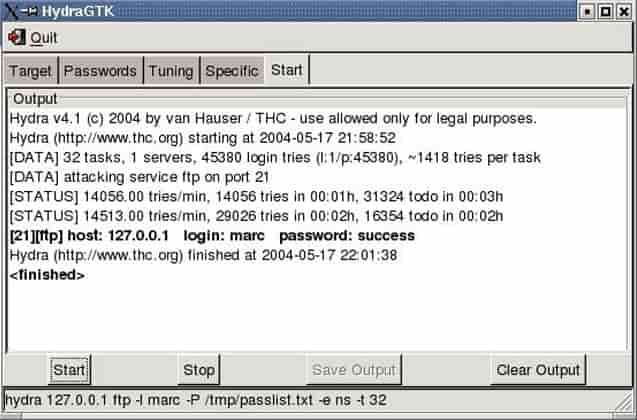

Basically for record maintenance, better readability and future preferences we can save the output of the brute force attack into a file by using the -o parameter. This tool gives you an option to save the result into the disk. I have enabled verbose mode also so that we can get detailed information about the attempts made while brute-forcing. As shown in the screenshot, while brute-forcing the password field, it will first check with the null option then the same option and after that reverse. for null, for same i.e., as same as the username and for reverse i.e., the reverse of username. Hydra has an option -e which will check 3 more passwords while brute-forcing. NULL/Same as Login or Reverse login Attempt d option enabled debug mode which, as shown displayed complete detail of the attack. It shows the complete detail of the attack with wait time, conwait, socket, PID, RECV hydra -l ignite -P pass.txt 192.168.1.141 ftp -d Now is the -d option used to enable debug mode. Here the users.txt has 5 usernames and pass.txt has 7 passwords so the number of attempts was 5*7= 35 as shown in the screenshot. Here, I have two wordlists users.txt and pass.txt so the brute force attack was making combinations of each login+password and verbose mode showed all the attempts. V option is used for verbose mode, where it will show the login+pass combination for each attempt.

Users.txt is wordlist for username and pass.txt is wordlist for password and the attack has displayed valid credentials ignite and 123 for the host. Now if you don’t have either of username or password, for that you can use a brute force attack on both the parameters username and password with a wordlist of both and you can use -P and -U parameters for that. Here, our wordlist is users.txt for which -L option is used, and password is 123 and for that -p option is used over ftp. You can use the -L option to specify user wordlists and the -p option to specify a specific password. You can brute force the field with correct username wordlists to find the correct. Assume you have a password for specific ftp login. You may have a valid password but no idea what username to use. Here -l option is for username -P for password lists and host ip address for ftp service.įor login ignite password 123 made success. If you have a correct username but want to login without knowing the password, so you can use a list of passwords and brute force on passwords on the host for ftp service.

If not, all necessary libraries are found during compile time, your available services will be less. This tool gives researchers and security consultants the possibility to show how easy it would be to gain unauthorized access from a remote to a system.Ĭurrently this tool supports: adam6500, afp, asterisk, cisco, cisco-enable, cvs, firebird, ftp, ftps, http-md5], mssql mysql(v4), mysql5, ncp, nntp, oracle, oracle-listener, oracle-sid, pcanywhere, pcnfs, pop3, postgres, rdp, radmin2, redis, rexec, rlogin, rpcap, rsh, rtsp, s7-300, sapr3, sip, smb, smtp, smtp-enum, snmp, socks5, ssh, sshkey, svn, teamspeak, telnet, vmauthd, vnc, xmppįor most protocols, SSL is supported (e.g., https-get, ftp-SSL, etc.). New modules are easy to add, besides that, it is flexible and very fast. It is a parallelized login cracker which supports numerous protocols to attack. Hydra – a very fast network logon cracker which supports many different services. Attacking on secured service connection.To attack on a specific port rather than the default.Password generating using various set of characters.NULL/Same as Login or Reverse login Attempt.To guess password for a specific username.In this article, I have discussed each option available in hydra to make brute force attacks in various scenarios. Being an excellent tool to perform brute force attacks, it provides various other options which can make your attack more intense and easier to gain unauthorised access to the system remotely. Hydra is one of the favourite tools of security researchers and consultants.

Hello! Pentesters, this article is about a brute-forcing tool Hydra.


 0 kommentar(er)
0 kommentar(er)
